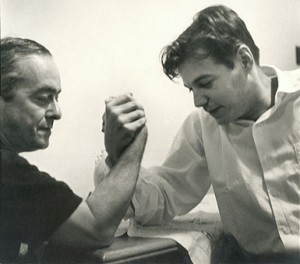-begins min. 1:14-
—
Translation Below
Carta de Vinícius de Moraes a Tom Jobim (“Carta ao Tom”):
Porto do Havre, 7 de setembro de 1964
Tomzinho querido,
Estou aqui num quarto de hotel, que dá para uma praça, que dá para toda solidão do mundo.
São 10 horas da noite, e não se vê vivalma.
Meu navio só sai amanhã à tarde e é impossível alguém estar mais triste do que eu.
E como sempre, nestas horas, escrevo para você cartas que nunca mando.
Deixei Paris para trás com a saudade de um ano de amor, e pela frente, tem o Brasil, que é uma paixão permanente em minha vida de constante exilado.
A coisa ruim é que hoje é 7 de setembro, a data nacional, e eu sei que em nossa embaixada há uma festa, que me cairia muito bem, com o Baden mandando brasa no violão.
Há pouco telefonei para lá para cumprimentar o embaixador, e veio todo mundo ao telefone.
Estão queimando um óleo firme!
Você já passou um 7 de setembro Tomzinho, sozinho, num porto estrangeiro, numa noite sem qualquer perspectiva? É fogo maestro!
Estou doido para ver você e Carlinhos e recomeçar a trabalhar. Imagine que este ano foi praticamente dedicado ao Baden, pois Paris não é brincadeira! Mas agora o Tremendão aconteceu mesmo! A Europa teve que curvar-se! Mas ainda assim, fizemos umas músiquinhas, como “Formosa“. Você vai ver! Tudo sambão! Parece até que a saudade do Brasil quando a gente está longe, procura mais a forma do samba tradicional do que a Bossa Nova; não é engraçado? São como diria o Lucio Rangel: “as raízes!”.
Vou agora escrever para casa, pedindo dois menus diferentes para minha chegada. Para o almoço, um tutuzinho com torresmo, um lombinho de porco bem tostadinho, uma couvinha mineira e, doce de coco. Para o jantar, uma galinha ao molho pardo, com arroz bem soltinho e, papos de anjo. Mas daqueles que só a mãe da gente sabe fazer! Daqueles, que se a pessoa fosse honrada mesmo, só devia comer, metida em banho morno, em trevas totais, pensando no máximo, na mulher amada. Por aí, você vê como estou me sentindo; nem cá, nem lá!
Fiquei muito contente com o sucesso de “Garota de Ipanema“, nos Estados Unidos. E Astrudinha, hein? Que negocio tão direito. Vamos ver se desta vez, os intermediários deixam “algum” para nós!
Fiquei muito contente também, com a noticia do sucesso de “Berimbau” aí no Brasil. Dizem que estão tocando a músiquinha “pra valer”! Isso me alegra muito pelo Baden. E pra que mentir? Por mim também! É bom saber que a gente não foi esquecido, que o povo continua cantando as nossas coisas; pois no fundo mesmo, é pra ele que a gente compõe! Lembro-me tão bem, quando fizemos o samba, uma madrugada, há uns 3 anos atrás, por aí. Eu disse ao Baden: isso tem pinta de sucesso. E ficamos cantando e cantando o samba até o sol raiar.
Letter from Vinícius de Moraes to Tom Jobim:
Port of Le Havre, September 7, 1964
Dearest Tom,
I’m here in a hotel room, which looks out over a plaza, which looks out over all of the lonesomeness in the world.
It’s 10 p.m. and not a soul to be seen.
My ship leaves only tomorrow afternoon and it’s impossible that anyone’s sadder than I am.
And as always at these times, I write you letters that I never send.
I left Paris behind with the longing of a year of love, and ahead of me, there’s Brazil, which is a permanent passion in my life as a constant exile.
The bad part is that today is September 7th – the national holiday – and I know that in our embassy there’s a party that would do me good, with Baden [Powell] tearing it up on the guitar.
A little while ago I called over there to greet the ambassador, and everyone came to the phone. They’re really burning the midnight oil!
Have you ever spent September 7, my dear Tom, alone, in a foreign port, on a night without any prospects? It’s rough, maestro!
I can’t wait to see you and Carlinhos [Lyra] and get back to work. Think that this year was practically dedicated to Baden, because Paris is no joke! But now the shit really went down; Europe had to bend over! But even so, we made some songs, like “Formosa,” – you’ll see! All sambão! It almost seems like when we miss Brazil, when we’re far away, we seek out the more traditional sort of samba rather than bossa nova; isn’t it funny? As Lucio Rangel would say, ‘roots!'”
I’m going to write home now requesting two different menus for my arrival. For lunch, a “tutuzinho” [dish of beans, bacon and manioc meal] with crackling, a toasty little pork loin, collard greens, and coconut sweets. For dinner, chicken with brown gravy, with rice that’s really loose just so, and “papos de anjo” (like Angels’ double chin – traditional Portuguese dessert). But the kind that only mom makes best! The kind that, if the person were truly honorable, should only be eaten while tucked into a warm bath, in total darkness, thinking at most about the woman he loves. You can see how I am: neither here nor there!
I was really pleased by the success of ‘Girl from Ipanema’ in the United States. And lil’ Astrud!? What a perfect deal. Let’s see if this time the intermediaries leave ‘some’ for us!
I was also really pleased by the news of the success of ‘Berimbau’ there in Brazil. I hear they’re playing the song ‘for real!’ That makes me really happy for Baden. And why lie? For myself too. It’s good to know that we haven’t been forgotten, that the people continue singing our songs; after all, deep down, that’s why we compose! I remember so well when we wrote the samba, one late late night, about three years ago. I told Baden: ‘this looks like a hit.’ And we sang and sang the samba until the sun came up.
Quem é homem de bem não trai o amor que lhe quer seu bem// A good man doesn’t betray the love that wants the best for him
Quem diz muito que vai não vai, assim como não vai, não vem // A man who says too much that he goes, doesn’t go, and just as he doesn’t go, he doesn’t come
Quem de dentro de si não sai, vai morrer sem amar ninguém // A man who doesn’t come out from within himself will die without loving anyone
O dinheiro de quem não dá, é o trabalho de quem não tem. // The money of the man who doesn’t give is the work of the man who doesn’t have it
Capoeira que é bom, não cai, e se um dia ele cai, cai bem. // Capoeira who’s good doesn’t fall, and if he falls one day, he falls right.
Capoeira me mandou, dizer que já chegou, chegou para lutar. // Capoeira sent me, sent me to announce he’s come to fight
Berimbau me confirmou, vai ter briga de amor, tristeza, camará // The berimbau confirmed for me, there’s going to be a duel of passion, sadness, my friend
— Commentary —
In 1963, Vinicius de Moraes assumed a post with the Brazilian delegation for UNESCO in Paris. He had worked as a diplomat since 1946, when he took his first post as Brazilian Vice-Consul in Los Angeles, beginning a life of “constant exile,” which he makes reference to in the letter. Lúcio Rangel, whom he quotes in the letter, was the music critic who introduced Vinicius and Tom in 1956. September 7th is Brazil’s independence day.
In early 1962 Vinicius met Baden Powell, and the two began an intense period of musical collaboration. Baden joined Vinicius in Paris in November, 1963.

When the military overthrew João Goulart’s government on March 31, 1964, Vinicius de Moraes returned to Brazil, where he resumed work as a cronista for Fatos e Fotos and writing pieces on MPB for Diário Carioca. As the country sank into the darkest years of the military dictatorship, Vinicius turned his attention more and more to his music. In 1964 he had a five-month run in a famous show with Dorival Caymmi, Oscar Castro Neves and Quarteto em Cy at Copacabana’s Zum Zum nightclub; the show’s 1965 album included this recording of the letter to Tom, and “Berimbau.” In 1966, Vinicius and Baden released their groundbreaking album Afrosambas, with sambas composed between 1962 and 1965, including “Berimbau.”

